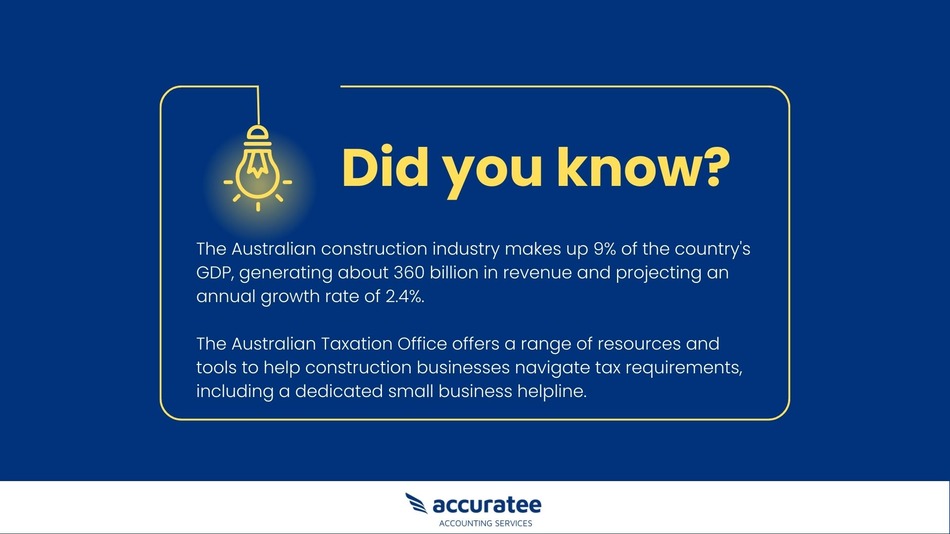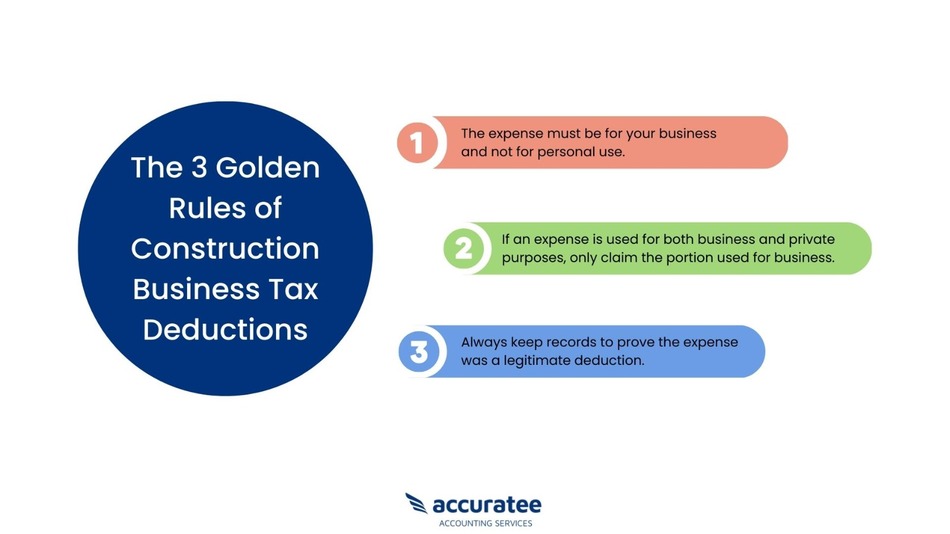What tax deductions should construction companies claim for maximum savings?
Introduction:
As a construction company, knowledge of important tax deductions is crucial. Taxes can be complex and daunting, but understanding your potential deductions can help you save time and money. Keeping track of available tax credits is not only essential to your bottom line, but it can also greatly reduce the amount of taxes owed at the end of each year.
In this blog post, we’ll provide an overview of what deductions apply to construction companies in Australia. By identifying and taking advantage of the most important tax deductions, your construction company can save money and improve your financial bottom line.
So, let's dive in and explore the tax deductions that your construction company should be aware of.
Key takeaways
Tax deductions can help construction companies save money and reduce tax liability in Australia.
Construction companies can claim deductions for motor vehicle, travel, repairs and maintenance, salaries and wages, and income protection insurance expenses.
Accurate record-keeping is essential for claiming tax deductions.
Different rules and methods apply to claiming different types of tax deductions.
Meeting specific requirements is necessary to qualify for certain tax deductions, such as income protection insurance.
What are tax deductions?
Tax deductions allow taxpayers to reduce their taxable income by claiming various expenses and investments incurred during the year. Doing so, it helps to lower the overall tax liability and save money.
However, the amount of tax savings one can enjoy through tax deductions vary based on the specific tax benefit they claim.
As a taxpayer, it is important to understand the different types of tax deductions available and claim them appropriately to maximize tax savings.

What tax deductible expenses are significant for construction business owners to consider in Australia?
If you're running a construction company in Australia, it's important to know about some of the tax-deductible expenses you might be eligible for. Some of the most significant deductions you can claim include the following:
-
Motor vehicle expense:
As an Australian construction entrepreneur, it's important to know that you may be eligible to claim a tax deduction for your motor vehicle expenses related to your business activities. This deduction can cover expenses such as:
- Fuel and oil
- Repairs and servicing
- Interest on a motor vehicle loan
- Lease payments
- Insurance cover premiums
- Registration
- Depreciation (decline in value)
To claim this deduction, it's essential to keep accurate records of your expenses and provide evidence that they were incurred in the course of your business activities. If you use your vehicle for both personal and business purposes, you can only claim a deduction for the portion of the expenses related to your business.
It's worth noting that you can use different methods to calculate your motor vehicles expenses, such as the cents per kilometer method or the logbook method. You should choose the most appropriate method for your situation and make sure that your claims are reasonable and accurate.
-
Travel expenses:
Travel expenses are a significant cost for construction businesses, so it's important to understand what you can and can't claim as a deduction. Generally, you can claim expenses related to airfares, transportation fares, car hire fees, accommodation, and meals when you or your employees travel for business purposes. However, it's crucial to exclude any private expenses, such as sightseeing, souvenirs, or expenses associated with taking a family member on the trip.
If you're claiming expenses for overnight travel, you must have a permanent home elsewhere, and your business must require you to stay away from home overnight. Sole traders and partners in a partnership must keep a travel diary to record overnight business travel expenses. For others, while it's not mandatory, it's highly recommended to keep one to ensure accurate claims.
If your employees travel for business, your business can pay for their travel expenses directly, provide a travel allowance, or reimburse them for their expenses. Just make sure you only claim expenses that were paid for by your business and not any private expenses.
-
Repairs, maintenance, and replacement expenses
You can even claim a tax deduction for expenses incurred in repairing, maintaining, or replacing machinery, tools, or premises that you use for business purposes.
Some of the expenses you can claim include painting, repairing electrical appliances, and fixing leaks. Furthermore, you don't need to own the item or property that is being repaired to be eligible for a deduction.
However, it's essential to note that you can't claim capital expenses like substantial improvements to an item or property, or repairs made immediately after acquiring them. Nevertheless, you can still claim a deduction for capital expenses over time using certain rules like the general depreciation provisions for items or the capital works provisions for the property.
-
Tax deductions for construction workers' salaries, wages, and super contributions:
It's important to know that you can reduce your taxable income by claiming tax deductions for the salaries, wages, and super contributions you pay to your employees and certain contractors. These expenses are considered operating expenses and can be deducted from your taxable income, which in turn reduces your tax bill.
Salaries and wages refer to the money you pay your employees for their work, including wages, salaries, bonuses, and allowances. Super contributions, on the other hand, refer to the money you contribute to your employees' super funds or retirement savings accounts. It's crucial to ensure that these contributions are made on time and to a complying super fund or RSA, as only then can you claim a tax deduction for them.
If you're a sole trader, you can also claim a tax deduction for your own super contributions in your personal tax return. This means that you can reduce your taxable income and contribute to your own super fund, which can benefit you in the long run.
-
Income protection tax deductions:
Income protection insurance is a type of policy that can provide financial support if an employee becomes ill or injured and is unable to work for an extended period. As an entrepreneur, it's essential to consider income protection insurance to protect yourself and your employees against any loss of income due to unforeseen circumstances.
The Australian taxation office allows construction businesses to claim a tax deduction for the cost of premiums paid for income protection insurance. However, there are specific requirements that must be met to qualify for this deduction. The premiums paid must be for income protection or continuing salary cover only, and any payment received under the policy must be included in the tax return.
It's important to note that the premiums cannot be claimed as a deduction if the policy is taken out through a superannuation fund and the premiums are deducted from contributions. Additionally, policies that pay a capital sum to compensate for injuries, such as life insurance, trauma insurance, or critical care insurance premiums, are not eligible for a tax deduction.
-
Other business expense
As a business owner, you also have the opportunity to claim deductions for certain business expenses that a building and construction employee can also claim, such as union dues, clothing expenses (including uniforms and protective gear), education costs, and subscription fees for business-related publications.
Additionally, if your work requires outdoor activities, you can also claim expenses for items such as sunglasses, sunhats, and sunscreen to protect you and your employees from the harmful effects of the sun. You can also claim other expenses that protect you or your employees from health or injury risks in your work environment.
Moreover, if you make donations to organizations that have a deductible gift recipient (DGR) status, you can claim these as deductions as well. So, make sure to keep track of these expenses and take advantage of the deductions available to you.
Expert Bookkeeping at Your Fingertips!
Record-keeping tips for construction companies in Australia
Here are some record-keeping tips for construction companies in Australia:
-
Keep accurate financial records:
Maintain detailed records of all financial transactions, including invoices, receipts, bank statements, and payroll information. You should also keep track of your expenses, such as materials, equipment, and labor costs. You can hire an online bookkeeper or use accounting software for construction to help you manage your financial records efficiently and accurately.
-
Store records in a secure location:
Keep the physical records of your work-related expenses in a secure location that is protected from theft, fire, or other disasters. If possible, make digital copies of important documents and store them on a secure server or cloud storage.
-
Keep records up-to-date:
Make sure that all records are up-to-date and that you are keeping track of any changes to contracts, budgets, or timelines. This will help you stay on top of your business operations and make informed decisions.
-
Comply with legal requirements:
Make sure that you are complying with all legal requirements for record-keeping, such as tax and superannuation laws, workplace health and safety laws, and environmental regulations.
-
Use software to streamline record-keeping:
Consider using construction bookkeeping software to streamline your record-keeping processes. This can help you save time and reduce the risk of errors. There are a variety of software solutions available specifically for construction companies.
-
Keep records for the required period:
Know the legal requirement for retaining records and keep them for the required period. In Australia, the Australian Securities & Investments Commission (ASIC) requires companies to keep records for seven years from the date you last lodge your tax returns.
-
Review and audit your records:
Regularly review your records and audit them to ensure that they are accurate, complete, and up-to-date. This will help you identify any potential issues and correct them before they become bigger problems.
How can you ensure your construction business is taking full advantage of tax deductions?
As the owner of a construction business, there are various techniques you can employ to leverage tax write-offs which can ultimately result in a lower taxable income and reduce your tax burden. To achieve this, consider implementing the following strategies:
-
Understand tax laws:
As a construction business owner, it is essential to have a good understanding of tax laws and regulations that govern your business. This can help you identify potential tax deductions and credits available to you.
-
Separate personal and business expenses:
Avoid mixing personal and business expenses. Ensure you have separate bank accounts and credit cards for your business, and only use them for business-related transactions. This makes it easier to track your business expenses and ensures you don't miss out on potential tax deductions during tax time.
-
Hire a tax professional:
A tax professional or professional accountant for construction can help you navigate the complex world of tax laws and regulations. They can identify potential tax write off and credits, advise you on the best tax strategies for your business, and help you stay compliant with tax laws.
-
Take advantage of tax Credits:
Tax credits offer a promising avenue to minimize your tax burden. Depending on your circumstances, you could qualify for various tax credits, including the work opportunity tax credit. This credit is designed to incentivize businesses to hire employees from specific target groups.
-
Plan ahead:
Planning ahead is essential to maximizing your tax deductions. Make sure you are aware of tax deadlines and plan your expenses accordingly. This can help you take advantage of potential tax deductions and credits before the end of the tax year.

Conclusion
Tax deductions are valuable tools that construction businesses should take advantage of when filing taxes in Australia. There are a variety of deductions specific to the industry that can be used to reduce one's taxable income.
Moreover, record keeping of all receipts is necessary for any deductions taken as this will help you remain compliant with the Australian Taxation Office. Additionally, it may also be useful to contact a professional to ensure your business is taking full advantage of every deduction available.
At CleanSlate, we understand the challenges of running and managing a construction business and have dedicated our services to helping clients optimize their taxation and financial activities. We invite you to contact us for expert advice on the most appropriate tax deductions for your particular situation and help navigate through this complex landscape.
Table of contents
Introduction Key takeaways What are tax deductions? What tax deductible expenses are significant for construction business owners to consider in Australia? Record-keeping tips for construction companies in Australia How can you ensure your construction business is taking full advantage of tax deductions? ConclusionJoin fellow entrepreneurs to receive regular expert advice
Get regular updates and educational resources designed by CleanSlate to help you make the right business decisions. No spam. Unsubscribe at any time.
Subscribe
Free business guides
Easy to read e-books, guides, and checklists to help you run your business smoothly.
DownloadOnline calculators
Try our easy-to-use calculators to get a snapshot of where your business stands financially.
Calculators
Let’s connect
Our accounting experts are available to provide you with the guidance and support you need. We offer a wide range of services, including bookkeeping, business advice and tax planning.
Book an appointment
-






